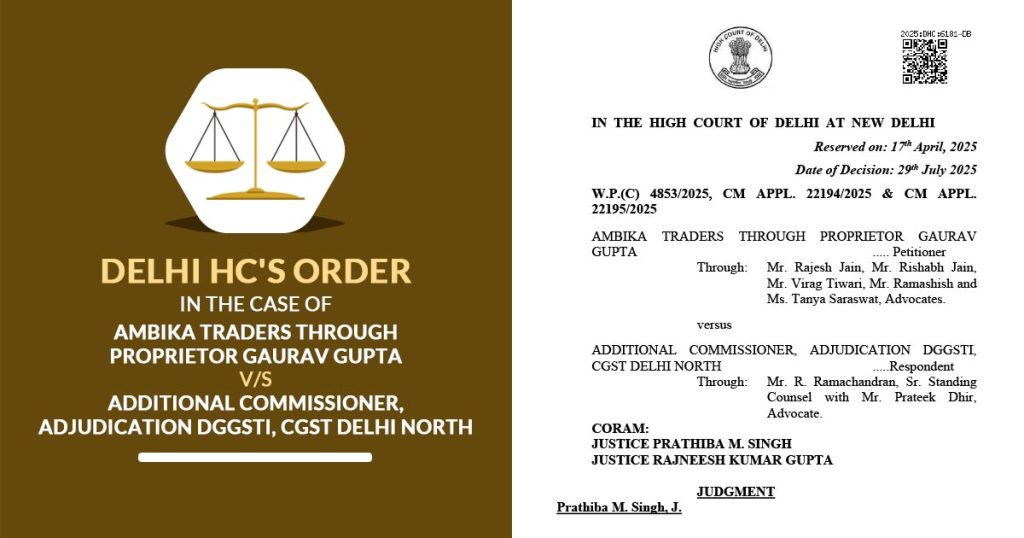
Consolidated show cause notice u/s 74 of the CGST is allowable and required to find out the fake claim of the ITC for the period, Delhi High Court ruled.
A division bench of Justices Prathiba M. Singh and Rajneesh Kumar Gupta said that,
“The nature of ITC is such that fraudulent utilization and availment of the same cannot be established on most occasions without connecting transactions over different financial years. The purchase could be shown in one financial year, and the supply may be shown in the next financial year. It is only when either are found to be fabricated or the firms are found to be fake that the maze of transactions can be analysed and established as being fraudulent or bogus.”
“A solitary instance of ITC utilisation in one financial year may not, by itself, establish a pattern of fraudulent utilisation. It is only when the series of transactions is analysed, investigated, and inquired into, and a consistent pattern is established, that the fraudulent availment and utilisation of ITC may be revealed. The language in the abovementioned provisions, i.e., the word period’ orperiods as against financial year’ orassessment year’ are therefore significant.”
Read Also:- Madras HC Quashes GST Orders Issued U/S 73 and 74 Without Proper Hearing on 10% Pre-Deposit Instead of 25%
The ruling is opposite to the decision of the Supreme Court’s Constitution Bench in State of Jammu and Kashmir and Others v. Caltex (India) Ltd (1966) which concerning the Sales Tax Act ruled that where an assessment contains distinct assessment years, each assessment year can be split up and examined and the items can be separated and taxed for different periods.
The firm of the applicant has claimed to be dealing in metal scrap. It assailed the order raising demand to the tune of Rs. 83,76,32,528/ on alleged ground of fake claim of Input Tax Credit in financial years 2017-2018, 2018-2019, 2019-2020, 2020-2021, and 2021-2022.
One of the main claims of the applicant before the High Court was that a consolidated demand cannot be raised for multiple fiscal years.
HC, while disagreeing, cited that Section 74 specifies that, at least as fraudulently availed or utilised ITC is concerned, the language utilised in Section 74(3) of the CGST Act and Section 74(4) of the CGST Act is “for any period” and “for such periods” respectively.
As per the court, it contemplates that a notice could be issued for a period that can exceed one fiscal year.
The court, this is opposite to the language used in sections 73(10) and 74(10) of the CGST Act, where the term “financial year” is utilised.
As per the court, “The Legislature is thus conscious of the fact that insofar as wrongfully availed ITC is concerned, the notice can relate to a period and need not be for a specific financial year.”
The court in this case said that exceeding Rs 83 Crores of fraud is alleged for the transactions between the years 2017 to 2021. Thus, a consolidated notice is not only allowable but in fact needed in these cases to build the illegal modality chosen by these businesses and entities.
Therefore, the relief was refused, and the court levied Rs 25,000 on the applicant.
| Case Title | Ambika Traders Through Proprietor Gaurav Gupta V/S Additional Commissioner, Adjudication DGGSTI, CGST Delhi North |
| Case No. | W.P.(C) 4853/2025 |
| For Petitioner | Mr. Rajesh Jain, Mr. Rishabh Jain, Mr. Virag Tiwari, Mr. Ramashish and Ms. Tanya Saraswat, Advocates |
| For Respondent | Mr. R. Ramachandran, Sr. Standing Counsel with Mr. Prateek Dhir, Advocate |
| Delhi High Court | Read Order |









